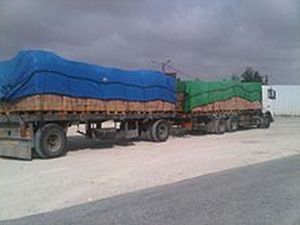“It can be hard for people outside Gaza to appreciate the harshness of these conditions,” said Gunness.
 Gaza City, June 8 – The ongoing Israeli and Egyptian blockade of this coastal territory has strained local availability of new anti-Jewish insults, all but compelling Gaza residents to use the same slurs again and again, relief agency workers warned today.
Gaza City, June 8 – The ongoing Israeli and Egyptian blockade of this coastal territory has strained local availability of new anti-Jewish insults, all but compelling Gaza residents to use the same slurs again and again, relief agency workers warned today.
United Nations Relief and Works Agency spokesman Chris Gunness appealed for international help to replenish Gaza’s dwindling supply of anti-Semitic epithets, which he said has never been lower. Gunness also called on the international community to pressure Israel to ease restrictions on the import of the slurs into the territory.
“It is shameful that the people of Gaza, especially the Palestinian refugee community, must rely on secondhand, third-hand, and sometimes fourth-hand insults to use when referring to Jews,” he said. “It can be hard for people outside Gaza to appreciate the harshness of these conditions, but this situation should provide some small indication of the daily privations the blockade wreaks on daily life here.”
Until recently, demand for new epithets could be met via numerous smuggling tunnels under the border with Egypt, but the al-Sisi government in Cairo has taken a hard line against the Muslim Brotherhood-allied Hamas, and has embarked on extensive operations to locate and destroy as many of those tunnels as possible in the border town of Rafah. The operations are part of a broader Egyptian effort to combat Islamist militants in the Sinai Peninsula, under which the border crossing to and from the Gaza Strip has been closed almost continuously.
In contrast, the Kerem Shalom crossing from Israel into Gaza has been active, with hundreds of truckloads of goods delivered almost daily, even during last summer’s war. Aside from specific materials that could be used militarily, Israeli officials say there are no major restrictions on what may be delivered to Gaza, and that there are no limits in place regarding ethnic or religious slurs.
“Other than explosives, armaments, and raw materials used in their production, the specific products delivered to Gaza are all a function of market demand,” said IDF Colonel Ofer Krainautloud.
Experts note that market forces are not enough to explain the shortage of anti-Semitic epithets in Gaza. “We also have to take into account Hamas’s policies,” said economist Paul Krugman of the New York Times. “Hamas has been taxing everything. The movement is cash-strapped, and they’re trying to raise money to repair their military positions and to rearm.”
“We shouldn’t be surprised that the leadership is willing to force the civilian population to continually reuse, for example, ‘the descendants of apes and pigs’ when other, newer insults are available,” he continued. “This is a group that’s willing to actively place that population in harm’s way for political gain. Depriving them of fresh ‘Zionist pig-dog’ occurrences, to them, is a no-brainer.”
Please support our work through Patreon.




